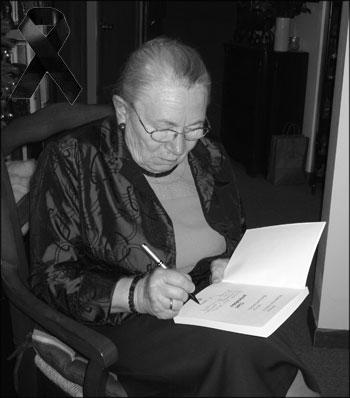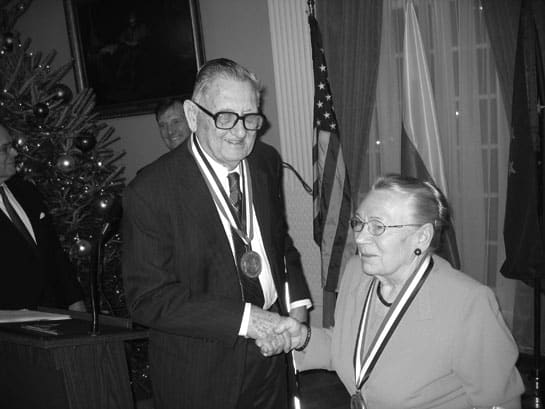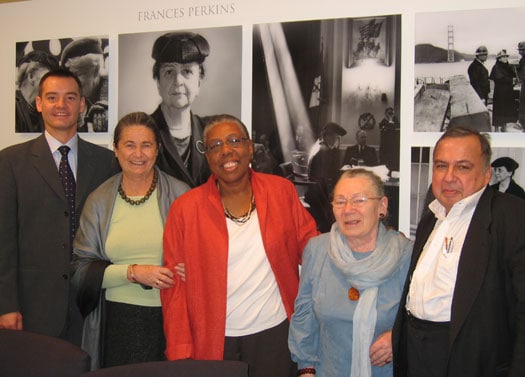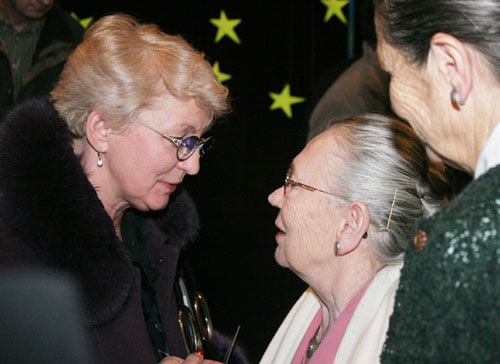

If the October Revolution of 1917 had its mythical Mother, in the near-allegorical title character of Maxim Gorky’s novel, then the 1980 Solidarity strike, and communism’s subsequent unraveling, had Anna Walentynowicz, who died in the 10 April plane crash in Smolensk.
Her name, pronounced Valenteenovitch, is synonymous with the Gdansk strike. Affectionately nicknamed Mala (“Tiny”) by her fellow shipyard workers, she was only 4-foot-5. She worked in the shipyard for 42 years, first as a welder, when she would crawl into the hulls of ships with her torch, then, after a bout with cancer, as a crane operator.
Her firing on 7 August 1980 and forcible removal from the shipyard two days later sparked the Gdansk strike, which began on 14 August. The strike was a birthday present from 17,000 shipyard workers to Walentynowicz, who was born on 15 August 1929.
In one of a series of conversations I had with her in 2000 (which form the basis of a section of the forthcoming book, Solidarnosc), she recounted the day the workers gave her this unusual gift.
Related video: A former Solidarity activist remembers Ryszard Kaczorowski, the last Polish president-in-exile, who also died in the Smolensk crash. Click here to see the interview.
“Piotr [Maliszewski] and Bogdan [Felski] arrive at my apartment, and I’m nowhere to be found. The woman in apartment 4 tells me the director’s car has arrived for me, and that I must immediately go with them to the shipyard.
“At first, I’m apprehensive, because I’m always followed, but she tells me it was OK, [it was] our boys from the shipyards. When we arrive at Gate 2 of the shipyard, Piotr simply commands the guard to open it, and to my complete amazement, the guard obeys. Inside [is] a sea of faces, workers as far as the eye can see. Out of the crowd a young woman, twentysomething, greets me with a bouquet of roses. I ask her, ‘Child, where did you get these flowers? It’s still early for roses.’ She responds, ‘From the director’s garden. They’re our roses!’

Anna Walentynowicz with General Edward Równy during her last visit to the United States in 2005.
“The boys lift me up on top of a mechanical shovel, above the sea of faces. I see a simple cardboard sign pinned to a plank [that says] RETURN ANNA WALENTYNOWICZ TO WORK, ONE THOUSAND ZL BACK PAY. An unforgettable, incredibly moving moment – that sign over the heads of the shipyard crowd!”
Walentynowicz was born in the Rivne (then Rowny) region of Volhynia, a province of what is today western Ukraine. As a 10-year-old orphan, she moved to Poland with a farming family who adopted her and treated her as little more than a servant.
In her early 20s, she ran off to Gdansk, where, like many displaced people from the borderlands, she eventually ended up in the shipyard. A self-made woman, she was also a single mother to her son, Janusz, born in 1952, until her marriage 12 years later to Kazimierz Walentynowicz, a friend from the shipyard.
She is survived by Janusz, who works as a merchant marine.
Walentynowicz’s journey from Hero of Socialist Labor to free-trade-union activist and her firing from the Gdansk shipyard inspired Andrzej Wajda’s Oscar-nominated 1981 film Man of Iron, in which she appeared, along with Lech Walesa.
Once recognized for exemplary work by the communist regime, Walentynowicz joined the opposition after her numerous protests against the inequities, poor conditions, and corruption in her work place went unheeded. She met with threats from Poland’s notorious security police, the SB, and spent a total of almost two years in prison. American journalist Georgie Anne Geyer dubbed her Poland’s Rosa Parks.
In this tragic time for Poland, in the 30th anniversary year of the Solidarity strike, it is worth remembering that the first protest of the Free Trade Union of Gdansk (WZZ), the cradle of Solidarity, was a 1978 hunger strike and church vigil for the imprisoned dissident Blazej Wyszkowski. Like many future Solidarity leaders, Walentynowicz joined WZZ in 1978 after attending the Rev. Hilary Jastak’s masses in support of Wyszkowski.
Walentynowicz, whose SB alias was Suwnicowa, or crane operator, was frequently detained and imprisoned for her acts of defiance. SB documents indicate at least one attempt on her life, a thwarted plot to poison her.
She was released in June 1982 from an internment center for Solidarity members. On 19 October 1983, Walentynowicz returned her Hero of Socialist Labor distinguished service medals – the brown, the silver, and the gold crosses – to protest the murder of the Rev. Jerzy Popieluszko by SB goons.
In December 1983, Walentynowicz was rearrested with Silesian dissident Kazimierz Switon for trying to memorialize miners who had been shot dead while striking from the Wujek mine in southern Poland two years earlier. She spent four months in a psychiatric ward.

First from R:Michael Szporer with Anna Walentynowicz and others in 2005.
A year later she took part in a hunger strike in the Church of St. Stanislaus Kostka in Oliwa-Gdansk, held to protest the arrest and beating of Solidarity leader Andrzej Gwiazda and to show solidarity with political prisoners in Polish jails. The hunger strike lasted 194 days and involved 371 people.
During her last visit to the United States in 2005, Walentynowicz accepted the Truman Reagan Medal of Freedom on behalf of Solidarity from the Victims of Communism Memorial Foundation in Washington, D.C. She was compared by leaders of the AFL-CIO union to the icons of labor like Frances Perkins, the New Deal-era U.S. labor secretary who presided over the birth of Social Security and the minimum wage and championed workers’ rights. Geyer, reflecting on powerful women around the world, called Walentynowicz the inspiration for the most decisive event that brought down communism.
Her first visit to the United States had been in 1989, for the opening of an apartment complex in Buffalo, New York, that bears her name. Had she lived, she would have spoken at Harvard in August to mark the 30th anniversary of the founding of Solidarity.
I met Walentynowicz in 2000 with Krzysztof Wyszkowski, Blazej’s brother. In Gdansk for observances of the strike’s 20th anniversary, I carried a bouquet of red velvet roses to “Pani Ania’s” house. We came with Krzysztof’s son, Konrad, who couldn’t have been more than 7. Walentynowicz offered Konrad a bar of Wedel chocolate and us some tea.
She seemed so much like my grandmother, religious, selfless, and tough, as so many Polish women are. Her long, stringy hair was pulled back into a simple bun. She wore thin, wire-rimmed glasses over penetrating blue eyes and high cheekbones.
We talked about why Janusz Sniadek, head of Solidarity, had not personally invited her to the ceremonies with roses rather than sending a simple invitation. She loved to good-naturedly needle Sniadek.
In post-communist Poland, Walentynowicz was portrayed in the press as a moralizing retiree, mainly for her dispute with Walesa, whom she accused of vanity. They patched things up in 2002 at the wedding of his daughter Magda, her goddaughter. But she warned, jokingly, that she would publicly slap Walesa if he were to run for president again.
She continued to be outspoken about the plight of the shipyard workers and the common people, whom she saw as forgotten amid the country’s political and economic changes. She criticized former opposition activists and Solidarity elites for abandoning Solidarity values and reneging on their promises.
It is fitting that one of the last letters written by Pope John Paul II was to Walentynowicz, wishing her a speedy recovery from back surgery. Her idea of social justice emerged from her profound Catholic faith. During her 2005 visit to the United States, she presented a bust of John Paul II from the people of Poland to the people of the United States.

Teresa B. Buckner from Chicago with Anna Walentynowicz in 2005.
Michael Szporer is a professor of communications at the University of Maryland University College in College Park, Maryland, and a board member of the Victims of Communism Memorial Foundation. Solidarnosc is expected out this year from Oxford University Press.
